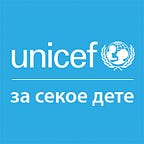Children are at the heart of one of the biggest movements of people in history. Tens of thousands journeyed through the former Yugoslav Republic of Macedonia in the hope of reaching safety or a better life in Europe. When policy changes led to border closures along the Balkan route, the Vinojug refugee and migrant transit centre became home to some fifty children for over ten months. Whether “refugees” or “migrants” — to UNICEF and partners, they have always been children first.
A child’s migration status should never be a barrier to accessing basic health services and enjoying their right to a healthy start in life. Two-month-old baby Ivan enjoys a physical development check-up by UNICEF supported partner, Meri Spasikj, from the Association of medical nurses, technicians and midwifes.
Upholding children’s dignity and resilience, and ensuring their rights and needs are protected is important for all children, and especially for the most vulnerable. Syrian children enjoy their right to play in a playground outside the UNCIEF supported child-friendly space, in the Vinojug transit centre.
With support from the Government of Japan, among other things, UNICEF provided some 5,000 boxes of micronutrient powder and 120 boxes of plumpy soup to complement the feeding of children and pregnant and lactating women in transit centres. Dushanka, a patronage nurse holds a healthy Syrian baby at the entrance of the child-friendly space in the Vinojug transit centre.
Early childhood recreational and arts activities give children a sense of normalcy, which is critical for their emotional wellbeing. Daniela and Kurdistana, 2 year olds girls participated in pre-school activities in the child-friendly space in the Vinojug transit centre.
Sometime, all children need is to feel safe, love, affection and to know that people care. Ivana, UNICEF partner from LaStrada cuddles two girls’ during play activities in the child-friendly space in the Vinojug transit centre.
After fleeing their homes and being on the move, many children miss out their right to education. Rawa (11) from Syria participates in an ICT class — one of the UNICEF supported non-formal education activities designed to help children catch up on learning and prepare for integration in formal education programmes.
No matter where they are from, no matter who they are, protecting their rights is always at the heart of everything we do. A happy four year old girls during early childhood recreational and arts activities organised in the UNICEF supported child-friendly space in the Vinojug transit centre.
The continuing effort from UNICEF to protect the rights and restore some normalcy in the lives of the refugee and migrant children in the former Yugoslav Republic of Macedonia is generously supported by the Governments of Japan, Germany and the United Kingdom, the European Commission’s Humanitarian Aid and Civil Protection department (ECHO), UNICEF’s National Committees, individuals and corporate and private partners.
Between developing and publishing this story, the number of children accommodated in the Vinojug transit centre reduced to eight after families accommodated in the transit centre voluntarily returned to Greece on the 12 March 2017.
